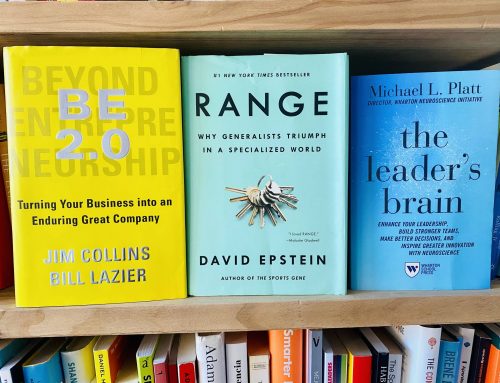The pandemic years have been a real test for lots of workers who were forced to make a deep dive into remote work overnight. Many leaders have also been challenged to manage their teams remotely without having the proper tools to do it successfully. A study on the impact of remote management led by Sharon K. Parker, Caroline Knight and Anita Keller highlights the need of managers to acquire delegation and empowerment tools to lead their teams in a hybrid environment. In their analysis of 1,200 people across 24 countries, the researchers show that the managers who have more difficulties leading remote teams tend to have controlling and distrustful bosses.
Remote work brings managers a unique opportunity to train delegation and trust, two core elements to foster autonomous teams. Have we learned the lesson?
What behaviors help us lead in a hybrid workplace?
-
To update and adapt the workspaces to the new ways of working.
Physical space matters and it is not just about being in the same room. If we go back to the office to do what we did before it will mean that we haven’t learned anything in this time. The new reality means that people stay home to work (=to get things done) and go to the office to collaborate (to strengthen their bonds with other people, to connect with them). One needs the other. This is why our office must adapt itself to foster a deeper collaboration.
In the last few years we have reduced interactions with new people and have focused on interacting with those we already knew, making it difficult to create new links. A simple and effective measure is to make people change spaces from time to time in order to interact with other people. This alone helps generate bonds that reduce silos and increase trust. And something fundamental, let us remember that there are workers whose process will be the reverse: due to personal or family circumstances, they see the office as the place to carry out tasks considered deep work (which require deep concentration) and therefore they will need to have spaces dedicated to them. Open spaces will not be enough.
If we take away from our workers the levels of flexibility and autonomy that they had achieved in these two years, it will undoubtedly have been a great lost opportunity.
-
To genuinely care about mental health.
Since March 2020, three out of four medications for anxiety, depression and insomnia are new prescriptions; that is, for people who had not had to take them before. On the contrary, according to a study by the University of Oxford and MIT, for every euro invested in supporting well-being and mental health, a return of four euros is obtained. Investing in mental health is not only necessary, but it is also profitable. An example of genuine concern is making mental health part of the conversation, putting it on the meeting agenda, asking team members how they are doing, and allowing a space for dialogue where those who need it can find resources. After a well-being and leadership program that we developed between 2020 and 2022 with 230 people in a Spanish company, the results revealed that while their levels of autonomy and physical well-being had increased in these two years, the levels of stress management and social and emotional well-being had fallen 9 points in that period, an essential information to know what training and support actions could respond to said need.
Investing in mental health is not only necessary, but it is also profitable.
-
To encourage curiosity, to imagine and to let others imagine.
We must understand that we are not facing the Great Resignation; we are facing the Great Exploration. According to Mike Clementi, VP of Human Resources at Unilever, the movement consists of accompanying people in their exploration before they decide to go looking for opportunities abroad and talent is lost. For Clementi, those leaders who know how to attend to the needs of their workers (and one of them is to ask questions and seek answers together) will have already traveled halfway. The American firm decided to offer coaching sessions to help its managers find their purpose and see how the organization can accompany them on this path. Other organizations such as Intel or Patagonia have gone a step further and for some time have been allowing people to spend part of their time on so-called “passion projects”, which range from solidarity projects to entrepreneurship and, why not, surfing. In the words of Yvon Chouinard, the founder of Patagonia, “it is about giving people the opportunity to make decisions about their lives while knowing that they have to perform at work. And in exchange for that performance they earn the right not to be in the office when there are good waves, whatever the day of the week”.
-
To leverage technology to enrich decision making.
A limited number of people can fit in a meeting room. In an online survey, infinite. Several leaders have taken advantage of technological tools to ensure that as many people as possible feel heard. Where before eight people were consulted to improve a strategic plan, now there are 300 people who receive that document and incorporate their ideas and suggestions. The result? The hybrid environment has favored a bottom-up management approach instead of the traditional top-down management. With questions like “What issues have we not been up to?”, “What questions have we not asked ourselves yet?” or “what are we going to do differently?”, the richness in decision making improves considerably and this is achieving an increased sense of belonging. A sense that experienced 45% decrease as a result of working from home. The tools are there, we just need to use them.
The hybrid environment has favored a bottom-up management approach.
-
To encourage the team to share how they are experiencing what they are experiencing.
The best leaders understand that resilience and well-being are a team sport and, when shared, they multiply their possibilities. Working with the HR team of a large retail company in their strategic conferences, I was surprised that when doing a retrospective of the last three years, in which each member marked the most positive events and lessons to be learned in this time, the hardest time of the pandemic was coincidentally the one with the most positive aspects, perhaps due to the nostalgic effect of time, in which the past is remembered better and the present is lived with more intensity and concern (hence the importance to take perspective with exercises like this).
Devoting small spaces to sharing these emotions helps us create an environment of vulnerability and security that allows the team to unite even more. Plus, it also helps each member verify that they are not alone or the only one who feels this way.
The quality of our conversations will multiply the quality of our relationships.







Leave A Comment